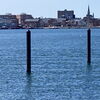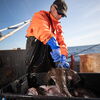Commercial fishermen oppose proposed oyster farm in Brunswick
 Courtesy / Mere Point Oyster Co.
This illustration, which appears in the Mere Point Oyster Co.'s application for a 40-acre lease in Maquoit Bay, shows how the oyster farm's cultivation pens would be adjusted seasonally to accommodate winter conditions.
Courtesy / Mere Point Oyster Co.
This illustration, which appears in the Mere Point Oyster Co.'s application for a 40-acre lease in Maquoit Bay, shows how the oyster farm's cultivation pens would be adjusted seasonally to accommodate winter conditions.
A group of Brunswick commercial fishermen opposed an application by Mere Point Oyster Co. for a 40-acre lease in Maquoit Bay.
“If I can’t go there because there’s something in the way, then I’m not going to stand for it,” lobster fisherman Andrew Ulrikson said during a Nov. 19 hearing held by the Department of Marine Resources, The Times Record reported.
But Marine Resources aquaculture program director Jon Lewis said that the project can be approved with conditions to follow certain practices.
On its website, Maquoit Bay Preservation Group terms the proposed project “an on-water factory” that could have “devastating effects” on the marine ecosystem, block boater navigation and cause noise from machinery.
But the Mere Point Oyster application says lobster and bait fishing rarely occur on the proposed site, navigation is sporadic and the operation would not interfere with other activities. Noise and light pollution would be limited by hours of operation, the “quietest equipment possible” and a canopied barge, the application says.
The application, for a 10-year lease, is to cultivate Eastern oysters, bay scallops and sea scallops.
Since 2015, the company has operated several so-called “limited purpose aquaculture” sites around Mere Point, produce market-size oysters. Estimated start-up of the larger size includes transferring 300,000 oysters of varying sizes from the limited-purpose sites to the new site in the first year. Then the company plans to add 500,000 oyster seeds per year until the site reaches maximum production goals of 1.5 million market oysters by 2021 and a holding capacity of 2 million seed oysters by 2021 with a maximum stocking density of 5 million oysters of various sizes by 2023.
In September, Mere Point co-owner Dan Devereaux told The Times Record that 40 acres is only a tiny fraction of the bay's 3,000 acres. He noted that oysters, as filter-feeders, also help clean the bay.
Mere Point's application is in line with Maine's growing aquaculture industry. Oysters are one of Maine's top three farmed species (along with Atlantic salmon and blue mussels), according to the 2017 Maine Aquaculture Economic Impact Report, published by the University of Maine Aquaculture Research Institute.










Comments